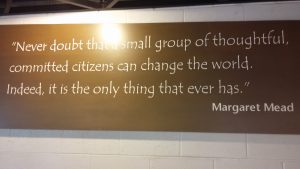“It’s a new challenge to see how people can change your look. I like words like transformation, reinvention, and chameleon. Because one word I don’t like is predictable.” ~Naomi Campbell
People have changed my “look” or outlook during my time with the Interfaith Committee for Detained Immigrants. Each day the volunteers, the staff members, and the people that ICDI ministers to have given me a chance to learn more about the immigration system and the work of ministry. Fridays with the Interfaith Committee for Detained Immigrants have been especially transformational. They have also been some of the most difficult days of the work week for me. However, it is not for the reasons one might typically think of. Fridays are not difficult because I have to get up early. Fridays are not difficult because it is the last day of the work week. Fridays are not difficult because I am anxiously awaiting for the weekend. Each Friday is difficult because of the loss and heartbreak that is so prevalent in the morning of this day each week.
Every Friday morning, the Interfaith Committee for Detained Immigrants goes to the deportation staging center in Broadview, Illinois for a prayer vigil. The staff and volunteers of ICDI stand in solidarity with our immigrant brothers and sisters and accompany families that are about to say goodbye to loved ones leaving the country. The ministry is difficult. I find myself desperately trying to grasp for words that could fix the heartbreak. However, every week, I find myself at a loss for words. “I’m sorry,” does not take away the pain of losing a father, a husband, a brother, a mother, a wife, or a sister. My words do not wipe away the tears streaming down the faces of the little children or parents or siblings.
However, amidst the heartbreak, I do see hope on these Fridays as well. Everyone that attends the prayer vigil always is transformed. Volunteers, pastors, priests, nuns, imams, rabbis, and laypeople stand with these men, women, and children. They stand with these families. They hear their cries and they hold them in their hearts. The encounter with our immigrant brothers and sisters leaves everyone with questions and a new perspectives on compassionate immigration reform. People go forth with new thoughts in mind. They cannot forget the cries or the faces or the names of the people impacted. Their perspective or “look” on the topic of immigration is always touched in some way. They seek positive change in the immigration system. And in this time of trial, the families affected every Friday are reminded that they are loved, being prayed for, and not forgotten.
On these Fridays, I also see hope at ICDI’s House of Hospitality in Hyde Park, Illinois. After the prayer vigil on Friday mornings, I travel to I spend the rest of my day at this house for teens, women, and their children who have been released from detention. I see hope in this place… a hope for a positive outcome not just the people residing in the home, but a hope without bars that could be a reality for all of our immigrant brothers and sisters. My interactions with the mothers, teens, and children bring moments of pure joy. I have loved getting to know all of the beautiful people and hear their stories. Each week has been filled with amazing memories I will not forget.
A couple of weeks ago at the House of Hospitality, I was playing with some of the little kids, and a little girl decided that she wanted to play with some face paint. She asked me if I could paint her to look like a cat. I happily agreed. After many giggles from being tickled by the paint, the little girl decided that she was happy with her friendly feline face mask. She then turned to me and said that she wanted to turn me into a butterfly. I saw how excited she was and agreed to let her transform me. After many minutes of focused artistry, I was transformed into a butterfly. With giggles of glee, the little girl exclaimed, “Go and check out your new look!”
As I stood and looked in a mirror and admired the artwork painted on my face, the little girl’s words rang in my ears. She had indeed transformed my look. Not only physically, but mentally and emotionally as well. My “look”… my perspective about ministry, hospitality, immigration, and so much more, has been impacted by this little girl. However, she has not been the only one that had participated in my transformation. My “look” has been impacted by the men and women in detention that I talked with twice a week. My “look” has been impacted by the families I encountered Friday mornings. My “look” has been impacted by the volunteers and staff of ICDI. My “look” has been affected
by the tears I’ve seen in the eyes of many people, including my own. And as I look forward, I hope that this “look” will affect me in a way that can create a positive change in this world. I look forward with hope and determination for compassion and change. I hope that I can lead in a way that gives others an opportunity to look through the eyes of others and treat everyone with dignity. And I hope to serve in a way that brings people together.
It has definitely been a challenge to see how people have changed my look. I cannot thank the Institute for Leadership and Service and the Interfaith Committee for Detained Immigrants enough for giving me the chance to experience such incredible work for the summer. These lessons, tears, laughs, prayers, and memories will not be forgotten.








